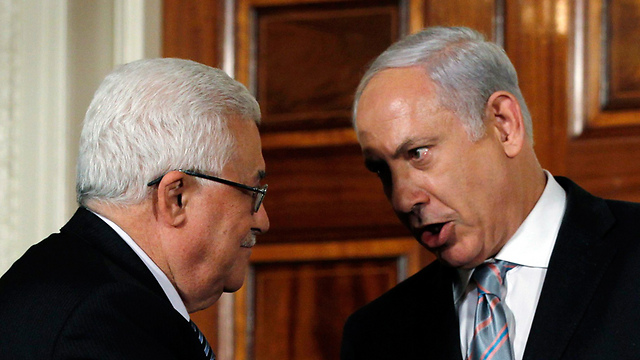
What will happen when a Palestinian state is established?
Hamas will become more moderate, standard of living in Israel will rise – perhaps settlers will remain in Palestine. Negotiations do not seem on way to completion, but comprehensive, first of its kind Israeli-Palestinian-Jordanian research shows an almost utopian picture
Economic prosperity, education for peace and lowering the cost of living: these are just some of the potential outcomes of the establishment of a Palestinian state within the framework of an agreement with Israel – according to an international study published Thursday.
Work on this first study of its kind included respected Israeli, Palestinian and Jordanian researchers, who examined in a series of meetings over the past year, and within several working groups, the consequences of the establishment of a Palestinian state within the 1967 borders with a capital in east Jerusalem.
Related stories:
The researchers predict that the Palestinian state would be secular and democratic, and within its framework, Fatah and Hamas would go through a reconciliation process and become legitimate political parties, and the ruling party would be elected in a democratic vote.
They also expect that Hamas will moderate its stance toward Israel. The study emphasizes that Hamas is a key player and without it, it will not be possible to reach an agreement that will last over time. The Palestinian researcher predicts that settlers could stay, living in a Palestinian state as residents.
Palestinian police (Photo: AP)
Palestinian statehood will lead to a gradual process of normalization, economic cooperation, education for peace and diplomatic relations. However, researchers say that there will need to be a symbolic reconciliation between the Israeli and Palestinian people, in order for peace to be felt on the streets, and that it not remain only between leaders.
Creation of a Palestinian state would allow the establishment of an organization for security cooperation zones, which will be based on the principles of NATO and handle regional threats such as terrorist
Stone throwing Palestinian youth (Photo: EPA)
The researchers estimate that the Israeli-Palestinian conflict costs Israel and the PA about 3 million tourists a year. This means an increase of 1.5 % in Israeli tourism, worth NIS 15 billion. Regional cooperation will help the transport of natural gas for the benefit of the entire region and could lead to a reduction of a quarter to a third of Israel's current energy prices, having a direct impact on quality of life.
Mahmoud Abbas and Benjamin Netanyahu (Photo: Reuters)
The study concludes that the establishment of the Palestinian state will solve the refugee problem because it will give them a way to meet their national aspirations . The process, as it was explained, would be similar to what Diaspora Jews experienced prior to the creation of the State of Israel and beyond. They anticipate that the situation of Palestinian refugees in Arab countries and Europe will get better than those in the refugee camps of Syria and Lebanon. Jordanian researchers described in the study the possibility of a confederation between Jordan and Palestine, which would be reflected in a rotation between the government of the Jordan Palestinian leader.
Brigadier-General (Res.) Udi Dekel, head of negotiations during the Annapolis period, participated in the project and explained that the starting point of "the day after the agreement "is a unique and interesting part of the process, which was sponsored and funded by the EU and the German Konrad Adenauer Foundation, and managed by the Center for Strategic Dialogue management at the Netanya Academic College.
These are rather optimistic conclusions and perhaps too optimistic. Dekel claims that the important thing is not optimism, but to show what is required of players in order for the agreement to hold water.
According to him, Israel is constantly criticized (for lack of progress in negotiations or their non-existence), but eventually the study presents a picture in which both the European countries and the international organizations have important roles to ensure the stability of the agreement – as do the Arab states, which must actively support it, and not just stand by and criticize. The results of the study will be presented later to members of the US Congress, the World Bank and the ministers in the Israeli government.
- Receive Ynetnews updates directly to your desktop













